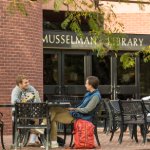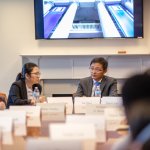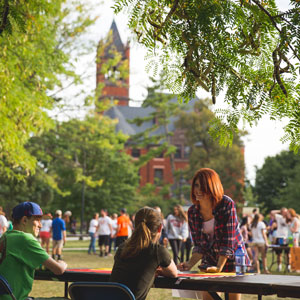

At Gettysburg College, we see value and power in the passionate voices of our students. Individually and collectively, their voices not only facilitate meaningful and productive conversations, but they also spur innovative ideas, action, and change.
Consortium of North American Peace Programs (CONAPP), a new undergraduate student-run and student-centered peace and justice conference, was built on this idea of uplifting student voices. CONAPP intends to give students in peace and justice studies and other related programs from Canada, the U.S., and Mexico a platform where they can share their research, cutting-edge ideas, and practices around peace, justice, conflict resolution, and activism.
“The whole concept that this conference was based around is Prof. Hakim Williams’ favorite book: The Pedagogy of the Oppressed by Paulo Freire. That book sets forth an idea for social change, which is called praxis—a combination of critical reflection and critical action,” said political science and public policy double major and peace and justice studies minor Jenna Thoretz ’21, a member of the CONAPP planning committee.
By pairing relevant research with discussion, CONAPP will help students develop actionable next steps for change. To further facilitate action-planning, Thoretz said that at future conferences they hope to give the best projects and research-informed ideas wings with seed grants.
Although some of these plans for CONAPP were postponed until June 2021 when the conference can be safely convened in person, a virtual conference was hosted by CONAPP in the interim on June 7, and brought together 40 undergraduate students from around the world via Zoom. The students discussed their visions for a post-COVID-19 world through the lens of peace and justice.
“It was very interesting facilitating these conversations over Zoom, because for most of the breakout groups, more than half of the participants weren’t from Gettysburg and weren’t people we met before, so they each brought forth their own unique perspective,” said political science and public policy double major and peace and justice studies minor Owen Keenan ’21, who recently joined the CONAPP planning committee. “I facilitated a group discussion on criminal justice and we had a woman from Canada who talked about how the Black Lives Matter movement intersects with indigenous rights in Canada, which has been gaining steam in that country.”
Within the breakout groups, participants also brainstormed what actions they can take in their own communities and on their campuses to advocate for students of color.
“We recognize that the planning committee is overwhelmingly white, and that’s important for us to recognize because we are really looking to amplify the voices of Black students and support them in any way we can. We’ve already begun doing some work in collaboration with other groups at Gettysburg College, like members of the Council of Student Activism, to think about and envision how we can work with the administration to change some things on campus,” Thoretz said. “We are not fully ready to share the specifics of the changes we’d like to see yet, but we’re in the discussion and planning stage.”
To keep the conversations going from the virtual conference, Anna Perry ’21 has created a CONAPP community discussion on Facebook, and anyone interested in contributing to the conversation may join the group.
“It’s more than just collaborating about our interests,” said Perry, an Africana studies major and peace and justice studies minor. “The hope is that by having us all engaged in that virtual space, we can begin to figure out what our resources and powers are and begin to mobilize the topics we discussed in the conference.”
Through CONAPP, Perry and their peace and justice studies peers want to build a community that lasts beyond the conference and empowers all students to feel like their voices can spark change, and that their subsequent actions can make a real difference.
“I hope that people are able to see that—no matter where they are in the world, no matter what their school community looks like—there is a larger community out there of people who are just as passionate and dedicated as they are; that we can really utilize each other and learn from each other, and actually work together to create some changes,” Thoretz said.
Learn more about peace and justice studies at Gettysburg College and how the program helps students explore strategies for redressing injustice and promoting peace.
By Molly Foster
Photo by Miranda Harple
Posted: 06/17/20


